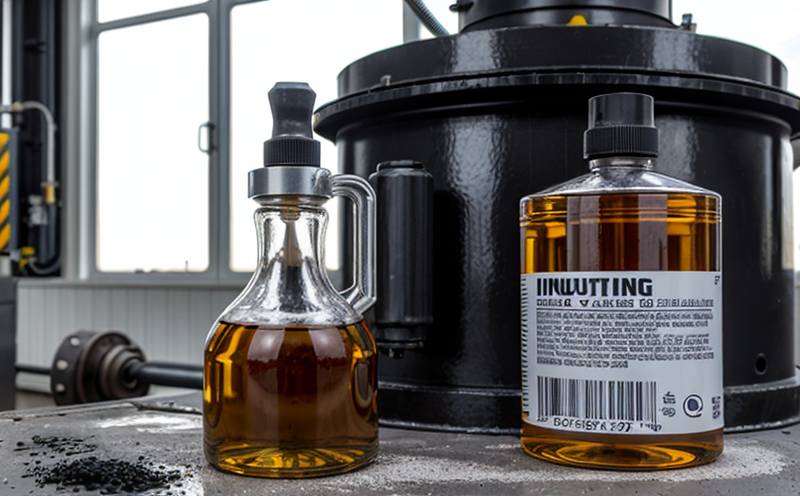DIN EN 14112 Oxidation Stability Testing of Biodiesel Oils
The DIN EN 14112 standard is a pivotal test method used to assess the oxidation stability of biodiesel oils. This critical parameter ensures that biodiesel maintains its chemical and physical properties during storage and use, particularly in conditions where it might be exposed to prolonged periods of oxygen contact.
Biodiesel, as a renewable fuel, plays an essential role in reducing greenhouse gas emissions and dependency on fossil fuels. Its production is derived from various biomass sources such as vegetable oils and animal fats. However, the oxidative stability of biodiesel can vary widely depending on its chemical composition and processing conditions. This variability necessitates rigorous testing to ensure consistent quality.
According to DIN EN 14112, oxidation stability is determined by measuring the rate at which a sample's viscosity increases over time under controlled conditions. The test involves heating a sample of biodiesel in an oxygenated environment while monitoring changes in its viscosity using a rotational viscometer. This method provides insights into the fuel's resistance to oxidative degradation.
The test setup typically includes a heated, oxygenated chamber where the biodiesel is exposed to air and heat for a specified period. The temperature range used can vary between 90°C and 150°C depending on the specific requirements of the biodiesel formulation. This range reflects typical storage and use conditions in various climates.
After the test duration, the viscosity of the sample is measured again using a rotational viscometer. Any increase in viscosity indicates oxidation has occurred. The rate of this change provides critical information about the biodiesel's stability. Compliance with DIN EN 14112 ensures that biodiesel meets the necessary standards for oxidative stability.
It is essential to perform these tests under controlled conditions to ensure accurate results. Factors such as temperature control, oxygen concentration, and sample handling are meticulously managed during testing. Proper specimen preparation involves ensuring the sample is free from contaminants and representative of the batch being tested. This careful attention guarantees reliable data that can be used for quality assurance and compliance.
The importance of DIN EN 14112 extends beyond just laboratory settings; it has real-world implications. By adhering to this standard, manufacturers ensure their biodiesel products remain stable during transportation and storage, reducing the risk of fuel degradation before reaching end-users. This stability also enhances engine performance and reduces emissions from incomplete combustion.
Additionally, compliance with DIN EN 14112 supports sustainability goals by promoting the use of renewable fuels that are less prone to oxidative degradation. The test results can be used in R&D efforts to improve biodiesel formulations further, thereby enhancing their overall quality and performance.
- Environmental Benefits: Reduced waste from fuel degradation
- Economic Advantages: Lower maintenance costs due to improved engine performance
- Safety Improvements: Decreased risk of fuel-related accidents in storage and use
In summary, DIN EN 14112 is a vital tool for ensuring the quality and reliability of biodiesel oils. Its implementation not only supports compliance with international standards but also contributes to broader sustainability goals by promoting the use of renewable fuels.
Applied Standards
DIN EN 14112 is primarily used in conjunction with other relevant standards such as ISO, ASTM, and EN. These standards provide a comprehensive framework for the testing and certification of biodiesel, ensuring that all aspects of its production and use are covered.
ISO 8217:2017 provides additional guidance on marine fuel specifications, which can be beneficial when assessing the suitability of biodiesel for maritime applications. ASTM D6751-19 offers supplementary information on biodiesel properties that complement DIN EN 14112's focus on oxidation stability.
Together, these standards ensure a robust and consistent approach to testing biodiesel quality, supporting both industry best practices and regulatory requirements. Compliance with these standards helps manufacturers meet the expectations of various stakeholders, including regulators, customers, and environmental groups.
International Acceptance and Recognition
DIN EN 14112 is widely recognized and accepted across Europe and in international markets. Its acceptance reflects the growing demand for renewable energy sources and the need to ensure these fuels meet stringent quality standards.
The standard's broad recognition contributes to harmonized testing protocols, which are crucial for facilitating trade and ensuring consistent fuel quality across different regions. Compliance with DIN EN 14112 is often a prerequisite for certification by international bodies such as the International Organization for Standardization (ISO).
Moreover, compliance with this standard enhances a company's reputation in the global market, demonstrating its commitment to high-quality and sustainable products. This recognition can open doors to new markets and partnerships, contributing to broader adoption of biodiesel worldwide.
Environmental and Sustainability Contributions
- Emission Reduction: Biodiesel is a cleaner-burning fuel that significantly reduces CO2 emissions compared to fossil fuels.
- Bioresource Utilization: By utilizing agricultural by-products, waste fats, and other organic materials, biodiesel promotes the efficient use of bioresources.
- Air Quality Improvement: The lower sulfur content in biodiesel leads to reduced particulate matter emissions, contributing to better air quality.
Biodiesel's environmental benefits are further amplified by its compliance with standards like DIN EN 14112. Ensuring that biodiesel maintains high oxidative stability helps prevent fuel-related issues that could lead to increased emissions or waste. This standard supports the broader goal of reducing reliance on fossil fuels and promoting sustainable energy solutions.





